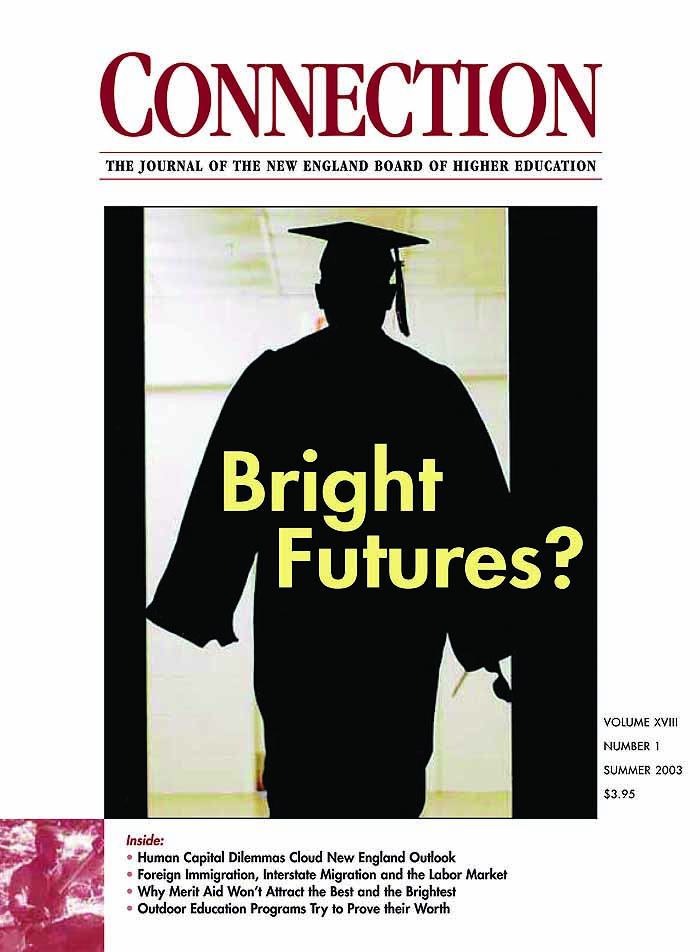
Click the cover image to view and download this issue in PDF format.
Summer 2003
For more information, contact:
John O. Harney, Executive Editor, Connection
617.357.9620
email: connection@nebhe.org
New England Board of Higher Education Journal Connection Explores Region’s Human Capital Future
BOSTON — A range of human capital challenges threaten New England’s economic well-being, according to articles in the Summer 2003 issue of Connection: The Journal of the New England Board of Higher Education.
Connection is the journal of the nonprofit New England Board of Higher Education – and America’s only regional journal on higher education and the economy.
Following is a summary of articles that appear in the Summer 2003 Connection:
Bright Futures? — Syndicated columnist Neal Peirce and colleague Curtis Johnson of the Citistates Group explain how human capital dilemmas cloud New England’s economic outlook. “If there is a trend worth watching now,” Peirce and Johnson warn, “it’s companies deciding that it’s just as effective and a lot less expensive to simply let the engineers stay in Bangalore and outsource the work to them.”
Imported Talent — More than 595,000 of the new immigrants who came to the United States during the 1990s were living in New England at the time of the 2000 census. Without them, New England’s labor force would have actually shrunk during the decade. Northeastern University economists Andrew Sum and Neeta Fogg and research associate Mykhaylo Trubs’kyy explain why New England is far more dependent than other regions on the new wave of immigrants and which education and training strategies are needed to ensure regional prosperity.
Reform Immigration! — Northeastern University President Richard Freeland calls on policymakers to link immigration policy more directly with labor-market policy. Freeland suggests that current temporary work-visa programs for foreign-born graduates of U.S. schools be scrapped in favor of a fast-track to citizenship for foreign students who excel in science, information and technology fields and pass muster under the Patriot Act.
Smart Routes — Despite increased competition from other states, New England remains a popular education destination for college students. Every in-migrating student brings a significant amount of money in tuition and expenses along with him or her; every out-migrating student takes money out of state and often out of the region. Moreover, studies suggest that students who attend college in the state where they graduated high school are likely to work in that state after college. nebhe Director of Policy and Research Michael K. Thomas offers a compelling analysis of migration patterns among New England college freshmen.
Aid Matters — National financial aid expert Donald E. Heller explains why merit aid is the wrong tool to attract the best and the brightest. “The research has demonstrated that merit aid programs do not increase college access for students who would otherwise be unlikely to attend college,” writes the senior research associate at Penn State’s Center for the Study of Higher Education. “Subsidizing existing college-going behavior can do little to help develop a skilled workforce.”
Jobbers — From a Catholic liberal arts college creatively enhancing its brand to a university nestled inside a state office building to a small business college networking its way into Gillette Stadium, a growing group of New England colleges and universities is aggressively seeking to capitalize on the educational benefits and student drawing power of programs that link college training to employer needs. Massachusetts higher education consultants James Martin and James E. Samels offers examples of innovative workforce development programs.
Local Heroes — Campuses and communities across New England are joining together to revitalize local neighborhoods, promote cultural tourism and develop sustainable communities. University of Massachusetts Amherst Director of Campus Planning and Space Management Judith Steinkamp explains how.
The Great Outdoors — Growing interest in wilderness and outdoor activities has created demand for competent outdoor professionals who combine the hard technical skills to lead a wilderness expedition, the soft social skills to manage a group and the scientific knowledge to be effective teachers. Journalist Monica Deady explains how New England college programs in fields from adventure management to outdoor education are answering the call.
Books — Sylvia Quarles Simmons, chair of Regis College and former president of American Student Assistance, reviews “Young, Gifted, and Black,” a series of essays on African-American achievement. Former Connecticut Higher Education Commissioner Andrew G. De Rocco reviews “The Work of the University,” a collection of writings by Yale University President Richard C. Levin. Connection’s
Excerpts department features the Lumina Foundation’s Robert C. Dickeson’s advice to governors on choosing academic winners and losers.
[ssba]
